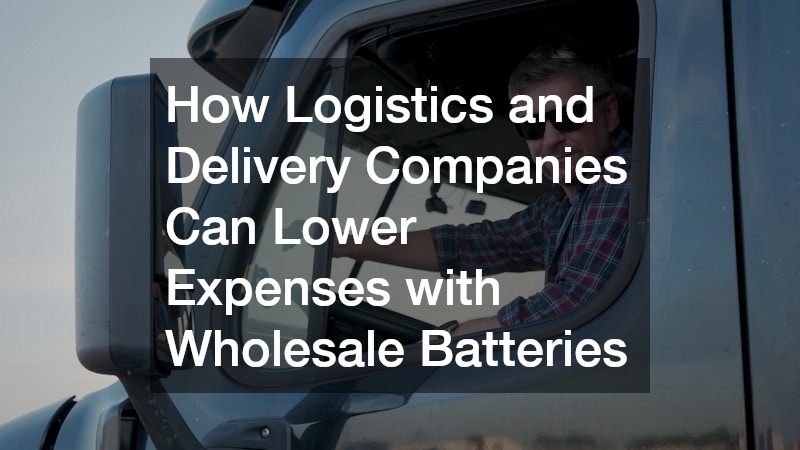Key Takeaways:
-
Buying from a battery store with wholesale pricing can cut logistics costs by up to 40%.
-
Wholesale purchasing ensures a steady supply of reliable power for scanners, GPS devices, and delivery vehicles.
-
Bulk buying reduces procurement and shipping costs while simplifying inventory management.
-
Choosing a trusted wholesale battery supplier improves efficiency, safety, and equipment lifespan.
-
Rechargeable and lithium batteries offer long-term savings and sustainability benefits.
-
Proper battery storage and recycling practices extend shelf life and meet environmental standards.
-
Partnering with an experienced wholesale supplier provides price stability and consistent availability.

In the logistics and delivery industry, operational efficiency and cost management are constant priorities. From handheld scanners to GPS tracking units and vehicle batteries, these businesses rely heavily on consistent, reliable power. One of the simplest yet most impactful ways logistics and delivery companies can reduce operational expenses is by purchasing from a battery store with wholesale pricing.
Whether you operate a local courier service or a nationwide logistics network, buying batteries in bulk can significantly lower overhead costs, improve equipment reliability, and ensure that power-related downtime never disrupts your delivery schedules.
This article explores how wholesale battery purchasing benefits logistics and delivery operations, what types of batteries these businesses typically use, and how to find the right battery store with wholesale pricing to maximize value.
1. The Power Demand in Logistics and Delivery Operations
Every delivery business depends on an ecosystem of devices that require constant power. From scanners used for inventory tracking to electric delivery vehicles and backup generators in warehouses, batteries are the unseen engine that keeps everything running.
Common Battery-Dependent Equipment
-
Handheld barcode scanners and RFID readers – Used in warehouses and on the road to track inventory and confirm deliveries.
-
GPS tracking systems – Essential for route optimization and real-time monitoring of delivery fleets.
-
Two-way radios and communication devices – Critical for team coordination, especially in large-scale operations.
-
Electronic signature pads – Often used by drivers for customer confirmation of deliveries.
-
Vehicle batteries (standard and deep-cycle) – Power delivery vans, trucks, and even electric bikes or small EVs.
-
Backup power systems – Used in depots and warehouses to prevent downtime during power outages.
Given this wide range of battery-dependent tools, the need for a consistent and affordable supply is obvious. That’s where partnering with a battery store with wholesale pricing provides tangible value.
2. Why Wholesale Battery Purchasing Makes Financial Sense

A. Cost Savings Through Volume Discounts
When logistics businesses buy batteries individually or in small batches from retail stores, they pay retail markups—sometimes 30% to 50% higher than wholesale prices.
By purchasing from a battery store with wholesale pricing, companies access bulk discounts that reduce the cost per unit, especially for high-usage batteries like AA, AAA, or lithium-ion packs.
For example:
-
Buying 1,000 AA batteries at wholesale pricing could save 20–40% compared to standard retail rates.
-
For larger equipment batteries (such as deep-cycle types for electric carts or backup systems), savings can reach hundreds of dollars per unit when ordered in volume.
B. Lower Procurement and Shipping Costs
Consolidating purchases from one reliable supplier reduces both administrative and shipping costs. Instead of placing frequent small orders, logistics companies can schedule bulk shipments quarterly or semi-annually. This streamlines procurement and reduces per-shipment expenses.
C. Reduced Downtime from Power Failures
Having batteries in stock ensures no device—scanner, GPS unit, or radio—goes offline due to lack of power. Operational interruptions caused by depleted batteries can result in delivery delays, labor inefficiencies, and customer dissatisfaction. A consistent wholesale supply prevents these costly scenarios.
D. Better Budget Forecasting
A predictable purchasing relationship with a battery store with wholesale pricing allows logistics managers to plan battery expenses in advance. Stable wholesale contracts often include fixed pricing for specific periods, shielding businesses from retail market fluctuations.
3. Battery Types Commonly Used in the Logistics Industry
Different parts of a logistics operation require different battery chemistries. Understanding which batteries to buy in bulk ensures cost efficiency and performance reliability.
A. Alkaline Batteries
-
Used for: Barcode scanners, flashlights, handheld remotes, and smaller devices.
-
Benefits: Long shelf life, reliable performance, affordable in large quantities.
-
Tip: Choose high-quality alkaline batteries with extended shelf life for backup supplies.
B. Lithium Batteries
-
Used for: GPS trackers, data loggers, and long-duration equipment.
-
Benefits: Higher energy density and longer lifespan compared to alkaline.
-
Tip: When buying lithium in bulk, ensure your battery store with wholesale pricing carries certified, safety-tested brands.
C. Rechargeable Batteries (NiMH or Li-ion)
-
Used for: Communication devices, barcode scanners, and electronic signature pads.
-
Benefits: Reusable hundreds of times, reducing long-term costs and waste.
-
Tip: Combine bulk purchases of rechargeable batteries with chargers to create a complete power solution.
D. Lead-Acid and Deep-Cycle Batteries
-
Used for: Forklifts, electric delivery carts, and warehouse equipment.
-
Benefits: Ideal for high-capacity power applications with consistent discharge cycles.
-
Tip: Partner with a supplier experienced in handling and shipping large-capacity batteries safely.
E. Specialized Industrial Batteries
-
Used for: Backup systems, UPS devices, and solar-powered fleet equipment.
-
Benefits: High reliability during emergencies or off-grid operation.
-
Tip: Ask your supplier about energy storage batteries that can integrate with renewable energy systems.
4. How to Choose the Right Battery Store with Wholesale Pricing
Selecting a supplier isn’t just about finding the lowest price. Reliability, product quality, and customer support matter just as much—especially when batteries power your daily logistics operations.
A. Reputation and Industry Experience
Look for a battery store with wholesale pricing that has experience serving industrial or logistics clients. Long-standing suppliers are often more consistent and knowledgeable about business-grade power needs.
B. Wide Product Range
A dependable wholesale battery store should carry a complete selection:
-
Alkaline and lithium batteries (AA, AAA, C, D, 9V)
-
Rechargeable packs and chargers
-
Industrial and vehicle batteries
-
Backup power and storage units
C. Competitive and Transparent Pricing
The best suppliers provide clear bulk pricing tiers (for example, per 100, per 500, or per 1,000 units). This allows businesses to compare cost efficiency based on volume and reorder frequency.
D. Shipping and Fulfillment Capabilities
For national logistics companies, fulfillment speed is crucial. Choose a supplier with multiple warehouse locations or fast nationwide shipping to minimize delivery delays.
E. Warranty and Support
Wholesale battery purchases should include product warranties and technical assistance. Reputable suppliers stand behind their products and offer replacements for defective units.
F. Sustainability Practices
Partnering with an eco-conscious battery store with wholesale pricing can strengthen your corporate social responsibility initiatives. Look for recycling programs or suppliers offering eco-friendly rechargeable batteries.
5. The Operational Impact of Reliable Power Supply
A. Increased Efficiency
When every scanner, tracker, and handheld device performs without power interruptions, delivery workflows run seamlessly. Drivers spend less time troubleshooting equipment issues and more time completing routes.
B. Improved Safety
Reliable batteries prevent mid-route device failures that could compromise driver communication or safety tracking. Equipment such as two-way radios and vehicle GPS systems must stay powered at all times.
C. Enhanced Customer Satisfaction
Late or lost deliveries due to equipment downtime directly affect customer satisfaction scores. Having a steady supply of quality batteries from a wholesale partner helps ensure consistent service reliability.
D. Longer Equipment Lifespan
Using high-quality batteries reduces the risk of leakage, corrosion, or inconsistent voltage output, all of which can damage sensitive electronics over time.
E. Reduced Environmental Footprint
Wholesale purchasing allows companies to plan bulk shipments efficiently, minimizing packaging waste and carbon emissions from multiple smaller deliveries.
6. Cost Breakdown: Wholesale Savings in Action
Let’s examine a simplified cost comparison to show the potential savings.
| Battery Type | Retail Price per Unit | Wholesale Price per Unit | Annual Usage (Est.) | Total Annual Savings |
|---|---|---|---|---|
| AA Alkaline | $0.80 | $0.45 | 10,000 | $3,500 |
| Lithium AA | $2.00 | $1.35 | 5,000 | $3,250 |
| Rechargeable Li-ion Packs | $25.00 | $18.00 | 1,000 | $7,000 |
| Deep-Cycle Lead Acid | $180.00 | $140.00 | 200 | $8,000 |
Estimated total annual savings: over $21,000 simply by switching to a battery store with wholesale pricing.
This doesn’t include indirect savings from reduced downtime, improved reliability, and lower procurement overhead.
7. Best Practices for Managing Bulk Battery Inventory
Buying in bulk comes with storage responsibilities. Proper handling ensures maximum battery performance and shelf life.
A. Store Batteries in a Cool, Dry Location
Excess heat can degrade battery chemistry. Maintain temperatures between 50°F and 77°F whenever possible.
B. Implement a First-In, First-Out (FIFO) System
Use older batteries first to prevent expired stock from accumulating.
C. Keep Batteries in Original Packaging
This protects terminals from short-circuiting and reduces exposure to air or moisture.
D. Separate Used and New Batteries
Avoid mixing depleted and charged batteries to prevent voltage imbalances in multi-battery devices.
E. Monitor Inventory Digitally
Integrate battery stock into your inventory management system to forecast future needs and track replacement cycles.
F. Recycle Responsibly
Partner with your battery store with wholesale pricing to manage recycling of used batteries safely and in compliance with EPA regulations.
8. The Future of Batteries in the Logistics Industry
Battery technology is advancing rapidly, offering opportunities for logistics and delivery companies to modernize their operations.
Emerging Trends:
-
Longer-lasting lithium-ion batteries for handheld devices are reducing replacement frequency.
-
Rechargeable fleet power solutions are being integrated into electric delivery vehicles and drones.
-
Smart battery monitoring systems provide real-time performance data, allowing managers to predict when replacements are needed.
-
Sustainable battery chemistries, including solid-state and recyclable materials, are becoming more affordable for wholesale buyers.
By staying aligned with a battery store offering wholesale pricing on cutting-edge products, logistics businesses can adopt new technologies early and stay ahead of competitors.
9. Partnering with the Right Supplier: Long-Term Benefits
A strategic relationship with a wholesale battery provider goes beyond cost savings—it builds long-term operational stability.
Key Advantages
-
Consistent Supply Chain: Never worry about power shortages during peak seasons.
-
Dedicated Account Management: Priority support for order planning and fulfillment.
-
Access to Latest Products: Early access to next-generation batteries at wholesale rates.
-
Bulk Contract Options: Locked-in pricing for extended periods, protecting your budget.
-
Tailored Recommendations: Suppliers can suggest optimal battery types for your specific devices.
Establishing such partnerships allows logistics and delivery companies to focus on their core mission: efficient, on-time delivery—without worrying about power reliability.
Final Thoughts: Powering Efficiency Through Smart Purchasing
For logistics and delivery companies, power reliability isn’t just about keeping devices running—it’s about ensuring every route, every scan, and every customer interaction happens without interruption.
Partnering with a battery store with wholesale pricing gives these companies a clear financial and operational advantage. From reduced costs and streamlined procurement to improved efficiency and sustainability, the benefits are measurable and long-lasting.
In a highly competitive industry where margins are tight and reliability is everything, wholesale battery purchasing is a small change that delivers big results.
By aligning with the right supplier and managing battery inventory strategically, logistics and delivery businesses can achieve consistent savings, maintain smooth operations, and keep their fleets powered for success.
